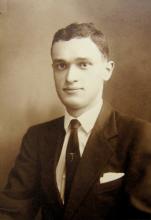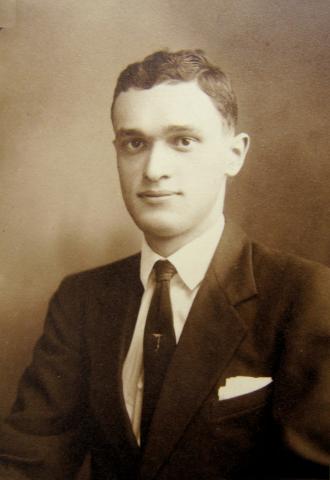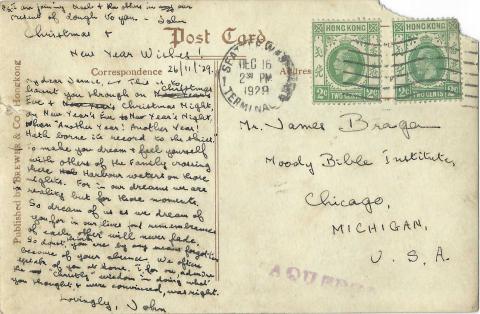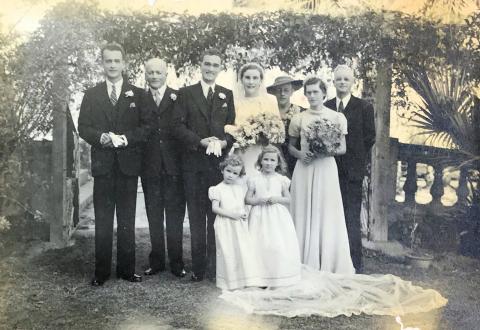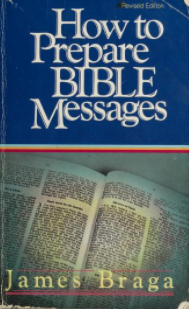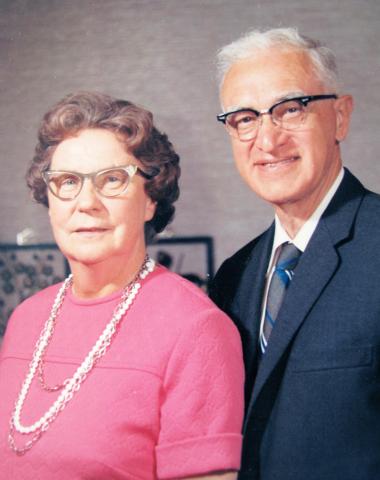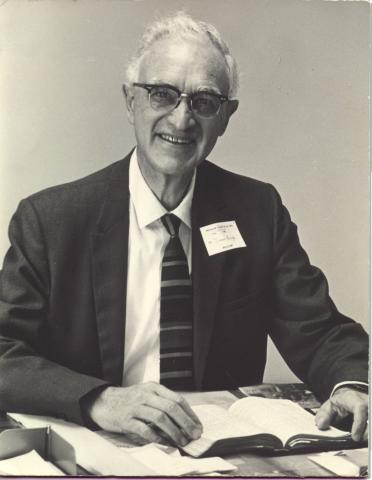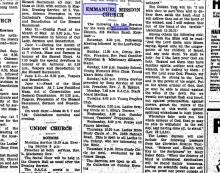James Braga
Baptist minister, Bible teacher and author.
Born, Hong Kong, 27 April 1906;
died, Milwaukie, Portland, Oregon, U.S.A.,
21 April 1994, aged 87.
James Braga was the eighth of thirteen children of José Pedro Braga and his wife Olive Pauline (née Pollard). He was educated at St Joseph’s College, Hong Kong’s leading Catholic secondary school, but through his mother’s godly ministry became a devout Protestant as a teenager. In the 1920s, he and several of his brothers became members of the Gospel Hall, the place of worship of the small Plymouth Brethren movement. They were a close-knit and supportive family, retaining life-long bonds of loyalty. During these formative years, he became a keen Bible student, and his yearning to teach the Scriptures to others became his life’s work and passion.
On leaving school, he worked for the Standard Oil Co. in Hong Kong and Foochow. With assistance from the Scripture Gift Mission in London, he distributed 250,000 Bible tracts.1 Eventually, he felt called to the ministry, and studied at Moody Bible Institute and later at the Northern Baptist Theological Seminary in Chicago, where he graduated as Bachelor of Theology. His father was bitterly opposed to this decision. When James wrote to his father in 1929 telling him of his intention, the reaction was swift and bitter. He sent the letter, scored across with red pencil, to his eldest son Jack, the only remaining Catholic. He wrote, furiously: ‘This is adding greater sorrow to my complete disappointment in James. With every year I find life’s cup of sorrow in the family gets a larger fill.’2
Other members of the family would have known of this rift. John, two years younger than James, knew how much it cost James to leave Hong Kong in these circumstances. He wrote to his brother, ‘So dream of us as we dream of you, for in our lives fond remembrance of each other will never fade. So do not think you are by any means forgotten because of your absence. We often speak of you at home. I, for one, admire the “Christly” wisdom in doing what you thought and were convinced, was right.’3
Returning to Hong Kong some years later, he was again employed by Standard-Vacuum Oil.4 He married a fellow Moody graduate, Anne Johnson, on 17 February 1940 in a civil ceremony at the American consulate and a religious ceremony at Emmanuel Church.5 They had no children. For a few months, James joined Anne’s work with an American mission, the South China Boat Mission, living and working among people who lived in junks moored in the typhoon shelter at Cheung Chau, one of the out-lying islands. Lacking privacy and with poor health conditions, it was a very sacrificial ministry, and seems to have affected Anne’s health permanently.
With the situation in the Far East deteriorating, James and Anne returned to America later in 1940, becoming the first of the brothers to leave the Far East for good, a break that all seven of his married siblings would eventually make. Before leaving, he made sure his mother was well stocked up with tonics and medicines he thought would be useful to her. They lasted for several years, and the remainder of the supply went with her to Macau in 1943.6
He was certain that there would be war, and warned those in Hong Kong. Tony later wrote to James that on the first day of the attack, 8 December 1941, ‘I couldn’t forgive myself for not having taken heed of your repeated warnings & sent Mother & the girls to Australia’.7
Left to right: Tony Braga (James’ brother, best man), Charles Wilson, James, Anne, Mrs Annie Wilson, Elizabeth Howard, Mr Warner (?).
Flower girls, Sheila Braga, Beth Raetz. The Wilsons were missionary friends.
Sheila was the daughter of Hugh and Nora Braga, James’ brother and sister-in-law.
Beth was the daughter of Erwin and Florence Raetz, other missionary friends.
James and Anne returned to North America, where he was ordained at Vancouver on 18 December 1940, and pastored Grace Gospel Church in Chicago, a small congregation unable to pay a living stipend. He did not abandon it, for James had no desire to lay up treasure on earth and he had no children to provide for. He resumed studies at the Northern Baptist Theological Seminary in Chicago, where he graduated as Bachelor of Theology in 1946. Anne found the harsh winters in Chicago hard to endure, so in July 1946 they moved to Sacramento (California) and later to Los Angeles.
During these years he also studied at the Los Angeles Baptist Theological Seminary and the California Baptist Theological Seminary.8 He gained the M.A. degree from George Pepperdine College, Los Angeles, with a thesis on Expository Preaching.9
In October 1949 he accepted an invitation to join the faculty of Multnomah School of the Bible in Portland, Oregon, where he taught Homiletics, Methods of Bible Study and Missions for twenty-six years. At weekends he served as pastor to a series of small congregations until they grew large enough to have their own minister. At least one of these was a Chinese congregation. Following his retirement in 1975, he continued as the school’s Chaplain for several more years, widely loved and respected.10
In 1969, his book How to Prepare Bible Messages was published by Multnomah School of the Bible, thus launching Multnomah Press, which became a thriving publisher of Christian literature. It was reprinted seven times before a revised edition was issued in 1981.
The following year, How to Study the Bible followed, and in 1990 a booklet, Discovering Scripture Memory. How to Prepare Bible Messages has been translated into at least seven languages and How to Study the Bible into at least five. One of James’ colleagues commented that through his books he was teaching many more Christian people than he ever taught in the classroom. They have remained in print in multiple languages for fifty years. It became his practice in his last years to pray daily for each of these translations by name, concerned not for the number of copies sold, but for their spiritual impact on their readers.
James and Anne moved in 1984 to Willamette View Retirement Center at Milwaukie near Portland, where he continued to write and to care for Anne, whose health had never been robust. His serenity, loving nature and utter trust in the providence of God won him a large circle of friends. Despite growing frailty, his life was filled with prayer and praise. Lacking children of his own, he became a loving ‘grandfather’ to families of his former students, always rejoicing in God’s goodness. In December 1992 he suffered a stroke, but was still able to maintain contact with a large family of nieces and nephews around the world almost until his death on 21 April 1994. Anne died two years later.
Thirty years after James’ retirement, in 2005, a thesis for a Master of Theology degree, “The Leadership Spirituality of Multnomah Bible College” explored the impact of the College’s leaders over period of more than fifty years. The writer interviewed Joyce Kehoe, registrar from 1955 to 1998, who observed, ‘Dr Braga seemed to experience more of a personal relationship with Christ [than others], more of a deep inner joy when he talked about the Lord … He wore it on his sleeve, not that he was showing it off, but that it was visible.’11
Another ten years later, on 15 March 2013, Multnomah, by then Multnomah University, dedicated one of its new student residential halls in his honour. Michelle Peel, the Alumni Officer, asked for information about him. My reply included the following comment, “Uncle James would never have sought to have his name on a building. He sought only to live in the daily presence of the Lord and to do His will. However, if the College has taken steps to provide affordable housing to its students, then he would say, ‘Praise the Lord’.”
A final, and very far-sighted step taken by James for the Braga family should be noted here. James was one of only two of the Braga siblings to have spent the war years outside Hong Kong or Macau, the other being Hugh, who left Hong Kong for Australia in June 1941. After the war ended, James, still in Chicago, contacted his siblings asking them to send him any letters they might have as a permanent record of these unforgettable times. He had received occasional letters from Macau, but none from Hong Kong. He kept them all, and sent copies to a few people who could be reached, including Noel’s mother-in-law in England.
Only a few people had kept letters, principally his mother Olive and his sister Caroline. They included a small but extremely important collection of Prisoner of War postcards from Maude at Stanley Internment Camp in Hong Kong. Several family members travelled across the world in 1945 and 1946 in the process of massive adjustment to a vastly changed world. These were Maude, Clement, Noel, Hugh, John and Mary. No letters were sent by them to James, presumably because they all went out in the clear-up necessary when they left the Far East. Jack had kept a large collection of letters, now in the J.M. Braga Papers, National Library of Australia. MS 4300.
James’ collection commences in June 1942 when several letters were sent to him from Macau, and concludes in mid-1946. In December 1986 James, then aged 79, sent me his collection. It will be housed in the National Library of Australia on completion of the transcription of the letters.
Stuart Braga, nephew
10 April 1999, revised 28 January 2000, 19 August 2017, 2 November 2020.
REFERENCES
- Obituary in the Sunday Oregonian, 24 April 1994.
- J.P. Braga to J.M. Braga, 5 June 1929, J.M. Braga Papers, National Library of Australia, MS 4300/2.3/2.
- John Braga to James Braga, postcard, 16 December 1929. Stuart Braga Papers, State Library of New South Wales. Subseries 24.8.1.
- Jurors’ Lists, 1938-1939, in the Hong Kong Sessional Papers.
- James’ mother later wrote to him, ‘your wedding picture on my radio table always by my bed’. Olive Braga to James Braga, no date, but possibly 27 June 1942.
- Caroline Braga to James Braga, 21 October 1945. James Braga Papers.
- Tony Braga to James Braga, 27 June 1942. James Braga Papers.
- “Multnomah Magazine”, Vol. 25, No. 4, May-June 1975, a note on his retirement, with details of his studies.
- At its opening on 21 September 1937, the founder, George Pepperdine, clearly stated his intentions for the college on that day: “Our college is dedicated to a twofold objective: First, academic training in the liberal arts . . . Secondly, we are especially dedicated to a greater goal—that of building in the student a Christ-like life, a love for the church, and a passion for the souls of mankind.”
- https://www.penguinrandomhouse.com/authors/75245/james-braga. Accessed 1 November 2020
- Bonnie Sue Kopp, ‘The Leadership Spirituality of Multnomah Bible College: its impact on the organisation today’. Master of Theology thesis, University of South Africa, 2005, page 137. Accessed 2 November 2020.
SOURCES
- J.M. Braga Papers, National Library of Australia, MS 4300
- James Braga Papers, to be housed in the National Library of Australia.
- Circular by James Braga to Multnomah Press authors, prepared at the request of the Press’s Marketing Dept., 28 December 1990. Stuart Braga Papers, series 24.9, State Library of New South Wales.
- Hong Kong Sessional Papers, 1928-1939.
- Sunday Oregonian, 24 April 1994.
